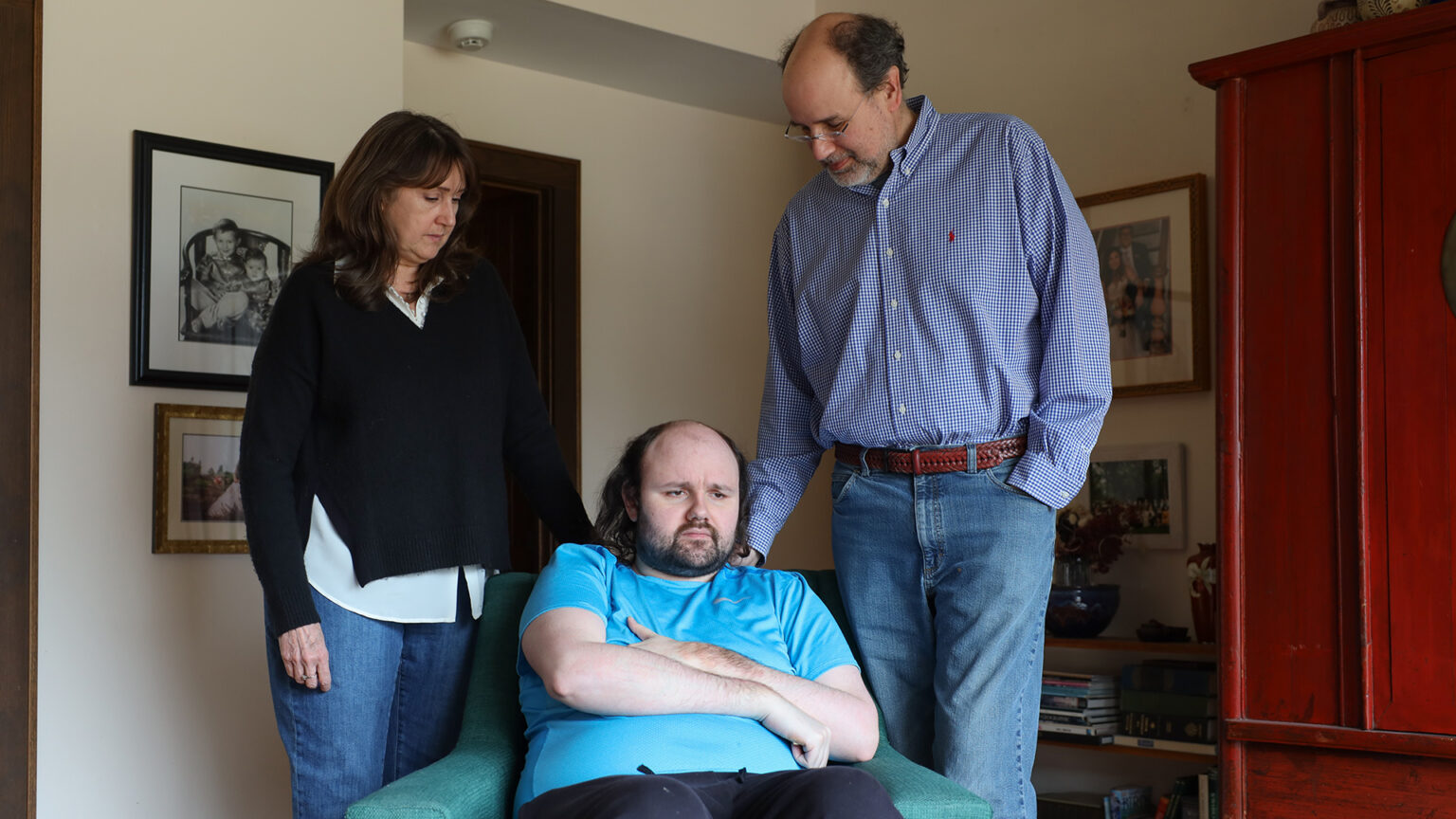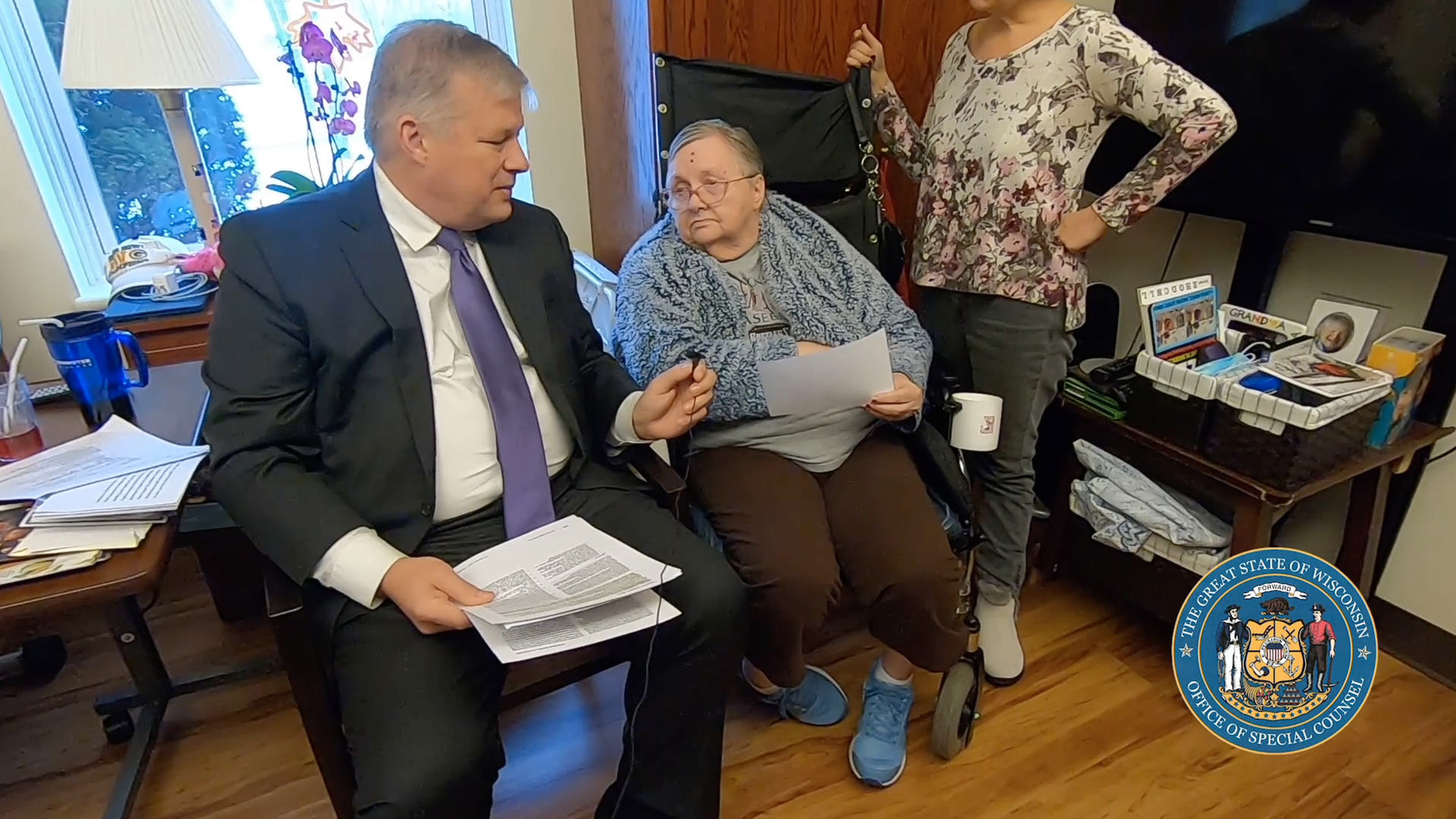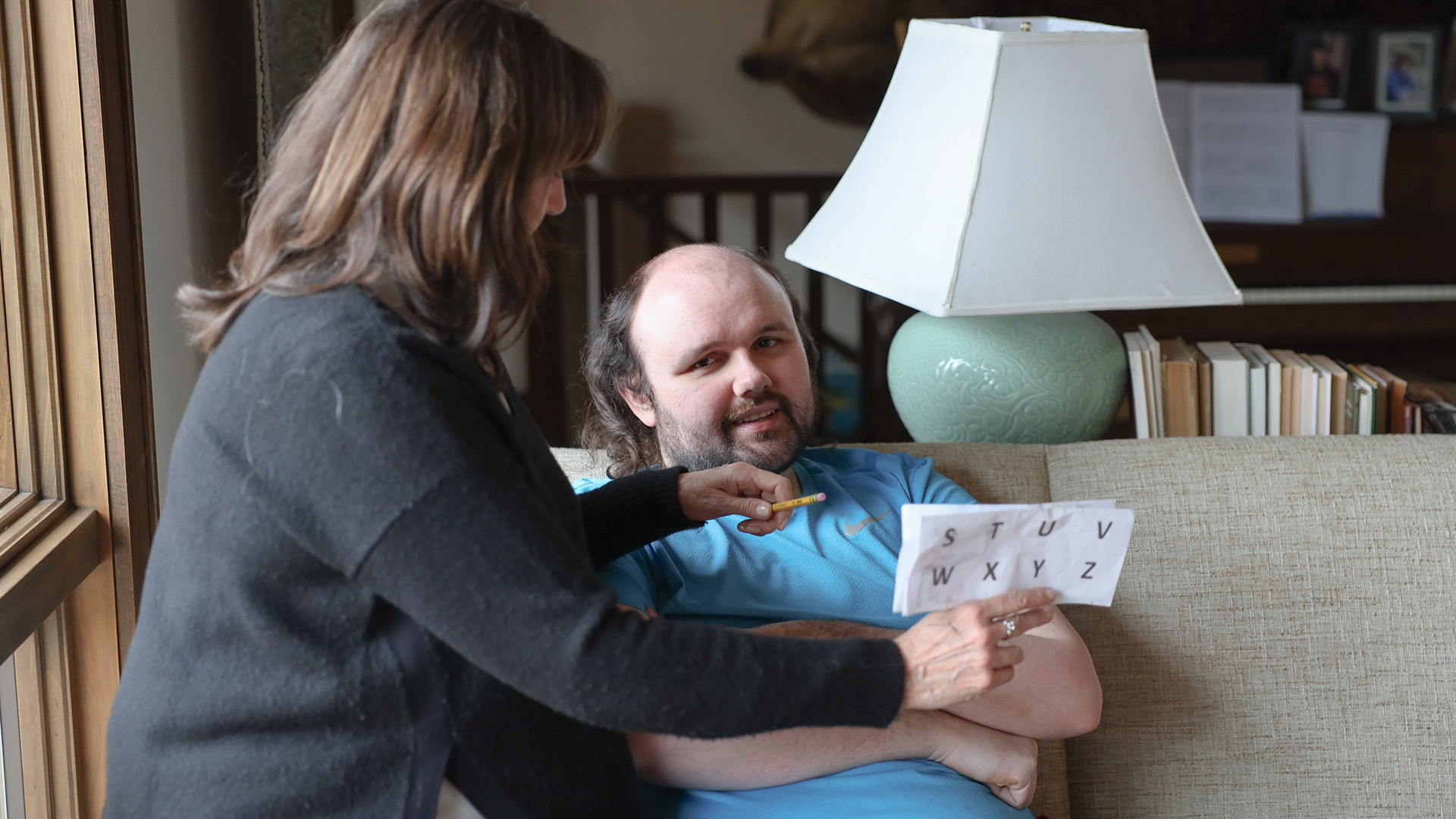Dane County election review finds dozens of ineligible voters who cast ballots
A small number of cases shows why election officials say Wisconsin's disorganized system for tracking those adjudicated 'incompetent' to vote needs a legislative fix.
Wisconsin Watch
March 27, 2023 • South Central Region

Susan and Mark Wallitsch are photographed with their son, Frank Wallitsch, in their home in Mount Horeb. Frank Wallitsch, who was placed under a guardianship related to his disability, lost his voting rights even though his parents did not intend for those rights to be removed. But despite being on the state's ineligible voter list, he was able to vote in previous elections. (Credit: Drake White-Bergey / Wisconsin Watch)

In 2015, Mark Wake was in a serious motorcycle crash that put him in the hospital for 10 months with a severe brain injury.
“I lost half my head,” he told Wisconsin Watch.
He also lost his voting rights when a Dane County judge placed him under a temporary guardianship.
The county’s register in probate sent that information to the Wisconsin Elections Commission, which added Wake’s name and Madison address to a list that contains more than 22,000 who have been “adjudicated incompetent” to vote in Wisconsin. The system is designed to protect mentally incapacitated people from having someone else fill out their ballot.
After Wake recovered, he said the guardianship was lifted, although no court records show his voting rights were restored — an additional step he apparently didn’t take at the time.
But in 2018, despite still being on the statewide ineligible voter list, Wake registered and voted in Poynette, a small Columbia County village where his name was not on the local ineligible voters list. In the 2020 presidential election, he voted again, this time in Madison as a previously registered voter.
Wake is one of 95 people in Dane County who altogether cast more than 300 ballots in past elections despite being on the state’s list of people deemed incompetent to vote, according to a county clerk’s office review of more than 1,000 records from the state’s list. The state elections agency is reviewing all 22,733 entries to ensure the list is accurate, spokesperson Joel DeSpain said.
“The ongoing review of this important topic involves multiple agencies and entities, each with different pieces at play,” DeSpain said. “Our goal is to be able to provide clean and complete statewide data.”
The number of confirmed cases of people voting after losing their voting rights is far more than previously known — and could mean there are hundreds more around the state. But the number is small compared with the millions of votes cast in statewide elections — and not enough to alter past results as former President Donald Trump and others have claimed.
The cases, however, point to a larger issue that election officials say requires a legislative fix: Unlike many other states, Wisconsin does not have a statutorily defined system for tracking people whom a judge rules are mentally incompetent to vote. In Wisconsin, some, but not all, counties notify state elections officials when a person is found incompetent to vote, DeSpain said.
“The system for identifying those voters and getting them out of the voter rolls is not working,” said Dane County Clerk Scott McDonell, whose office conducted the review of that county’s ineligible voter list at Wisconsin Watch’s request. McDonell said he has informed local election clerks of any discrepancies.
That creates a new wrinkle for some voters like Wake, who may be turned away the next time they go to the polls unless they go to court to ensure their voting rights are restored — and that information is updated on the state list.
Wisconsin Watch did not review every case, but a few that it did review pointed to human error, rather than coordinated or intentional illegal voting.
Ineligible voters under scrutiny
The issue first gained attention as part of former Supreme Court Justice Michael Gableman’s partisan investigation into the 2020 election. Gableman identified a couple of cases of people in nursing homes who had voted despite a court removing their voting rights.
His report didn’t include any names, but one was the case of Sandra Klitzke, an Outagamie County nursing home resident whose family questioned why she was able to vote in the November 2020 and April 2021 election after a court removed that right in February 2020. Klitzke’s family filed a complaint against the Wisconsin Elections Commission.
The commission dismissed the complaint, noting the court official had no legal obligation to notify election officials of Klitzke’s status.
A Wisconsin Watch review, first reported in October 2022, found Klitzke voted absentee with nursing home staff acting as a witness, primarily because the local town clerk had not deactivated Klitzke’s voting registration and state law allows absentee ballots to be sent automatically to indefinitely confined registered voters. Klitzke’s voter registration was deactivated in April 2022.

Thomas More Society lawyer Erick Kaardal interviews nursing home resident Sandra Klitzke in a video that was played at a Wisconsin Assembly elections committee hearing on March 1, 2022. Klitzke voted in 2020 and 2021 despite a court finding her ineligible, most likely due to administrative error. (Credit: Wisconsin Assembly Office of Special Counsel)
During the COVID-19 pandemic, the Wisconsin Elections Commission waived a rule requiring special voting deputies to visit nursing homes, which meant nursing home staff were tasked with helping residents fill out ballots. Disability Rights Wisconsin had warned nursing homes that their Medicare and Medicaid funding depended on ensuring their residents could vote. However, because Klitzke’s voter registration had not been updated, staff wouldn’t have known she wasn’t supposed to vote.
The Gableman investigation, which so far has cost taxpayers $2.5 million, was disbanded in August 2022 by Republican Assembly Speaker Robin Vos after being criticized for shoddy work and misunderstanding of state election law. But Gableman’s report did show the potential impact of an inaccurate voter list, especially for “indefinitely confined voters” whose absentee ballots are automatically sent to them.
Review finds more cases of ineligible voters voting
Wisconsin Watch also reported in October that Dane County had reviewed a random sample of 20 entries from the WEC list and found two examples in which someone was either still registered or had cast a ballot. McDonell said at the time that the finding had prompted a full review of about 1,000 records.
That review found 95 individuals who had voted, many in multiple elections, after being adjudicated incompetent to vote, plus another 23 who were still listed as a registered voter but hadn’t voted. The vast majority, however, never registered to vote, are listed as inactive because they are deceased, or a local clerk correctly deactivated their registration.
WEC officials declined to comment on how many cases they are finding statewide before their review is complete.
The voters identified from just Dane County cast more than 300 votes since 2008 — more than the 192 prosecuted election fraud cases over the past decade in the entire state. However, the numbers don’t tell the whole story.

Dane County Clerk Scott McDonell conducted a review of about 1,000 names from the state’s list of people a court deemed incompetent to vote and found 95 examples of someone who voted after being added to the list. He says the state needs to fix how it keeps track of such people. (Credit: Coburn Dukehart / Wisconsin Watch)
The Dane County review found examples of data errors, such as a voter listed in the state adjudicated incompetent list with the same birthdate and adjudication date, almost certainly because of a manual input error. In another case, a voter had the same name, birthdate and address in both the adjudicated incompetent list and the WisVote voter registration database, but a different middle initial.
In 59 of the 95 cases, the voter had a different voter registration address than the address listed in the state’s adjudicated incompetent list. Those address changes could explain why many people on the state’s list were able to vote. In Wake’s case, Poynette Clerk Natalie Megow said his name was not on the ineligible voter list at local polling places because it only contained people from the statewide list with a Poynette address. Also, under state law, the local ineligible voter list only includes those still serving a felony sentence.
“If he walked in the door and proved his residency, we would have no reason to turn him down,” Megow told Wisconsin Watch.
Human error at play in many cases
Dane County Clerk of Courts Carlo Esqueda checked the list at Wisconsin Watch’s request and found one example of a person who had voting rights restored in 2012, but the statewide list wasn’t updated to reflect that.
In another case, Frank Wallitsch, a New Glarus man with developmental disabilities, was placed under guardianship in 2010 when he turned 18. He had his voting rights removed, and his name was placed on the statewide ineligible voter list. Since then, he has voted in at least 16 elections.

Frank Wallitsch is photographed with his mother, Susan Wallitsch, in her home in Mount Horeb. Frank is functionally nonverbal, but he can point to letters on a sheet of paper to communicate. While being photographed, Frank spelled, “Navigating law is hard,” using the paper. (Credit: Drake White-Bergey / Wisconsin Watch)
His mother Susan Wallitsch, a disability rights advocate from Mount Horeb, told Wisconsin Watch that she erred in 2010 when the lawyer representing her son in court filled out the guardianship paperwork. She did not intend to have the court remove her son’s voting rights, and didn’t notice that the box for removing his voting rights was checked.
But when she took her son to register to vote, no one notified her his name was on the statewide list. Frank Wallitsch doesn’t speak and requires intensive physical assistance, but he is able to point to letters and spell, his mother told Wisconsin Watch.
“He’s very aware of political situations and very interested in voting,” she said. “We’ve never been told he’s technically not allowed to vote, and we completely missed it in the paperwork at the time that it was done.”
No automatic checks for voters found ‘incompetent’
The potential for human error is compounded by a system that is only loosely organized to catch such problems.
Wisconsin is one of 34 states that allow courts to remove a person’s voting rights for mental health reasons, according to the National Conference of State Legislatures. But unlike the majority of those states, Wisconsin does not specify how courts should transfer that information to election clerks.
Instead, the Wisconsin Court System devised a system in 2008 for county registers in probate to submit forms to the state elections agency notifying it of people adjudicated incompetent to vote. Many counties still submit those forms by mail, others submit them by email and some don’t submit them at all, preferring to directly communicate the information to a local clerk, Wisconsin Watch found.
WEC staff input that information into a database, but the agency doesn’t have authority to deactivate those voters’ registration status — only local clerks can do that.
If someone’s name, address or birthdate is different between the list and voter registration form, a clerk might not assume it’s the same person. And if someone moves after being adjudicated, that information may not be updated on the statewide list.
Wisconsin’s election database has a system for automatically checking if someone who registers is deceased, a duplicate or someone still serving a felony conviction. But it does not automatically check for people on the adjudicated incompetent list, McDonell noted.
Election officials want legislative fix
Rep. Scott Krug, R-Nekoosa, chair of the Assembly Committee on Campaigns and Elections, said improving the system for tracking those adjudicated incompetent was one of the top issues raised by the Wisconsin County Clerks Association in a recent meeting. He said he expects to work with WEC, county clerks, Democratic lawmakers and the governor’s office to find a bipartisan solution.
“It just needs to be more standardized across the board,” Krug said. “The goal is not just to throw everything at the wall that we did last session, but to have more deliberative conversations with people ahead of time so they know what to expect.”

Rep. Scott Krug, R-Nekoosa, chair of the Assembly Committee on Campaigns and Elections, said he hopes to find a bipartisan solution to fix how the state tracks those who are adjudicated incompetent to vote. (Credit: Coburn Dukehart / Wisconsin Watch)
One complicating factor is the court records of people under guardianship are confidential under state law.
The Wisconsin Voter Alliance, a conservative advocacy group whose director Ron Heuer was one of Gableman’s investigators, has brought lawsuits in 13 counties to obtain the records of people under guardianship to check them against the statewide voter registration list.
Circuit courts have rejected those arguments, but the cases are being heard by the 2nd and 4th District courts of appeals and could make their way to the Wisconsin Supreme Court.
Barbara Beckert, director of external outreach for Disability Rights Wisconsin, said there has been a lot of focus on the “relatively small number of people” found incompetent by a court who are voting, which does need to be addressed. But, among other voting obstacles, her organization remains concerned about challenges some face in restoring their voting rights, registering to vote in nursing homes and ensuring the privacy of those under guardianship is protected.
Meanwhile, the WEC continues the arduous process of going through boxes of paper files to ensure court data are correct and election clerks are notified of any incorrect voter registration information. But fixing the system really needs to happen at the Capitol, DeSpain said.
“Ultimately,” he said, “the path forward to improving this process primarily lies with the Legislature.”
The nonprofit Wisconsin Watch collaborates with WPR, PBS Wisconsin, other news media and the University of Wisconsin-Madison School of Journalism and Mass Communication. All works created, published, posted or disseminated by Wisconsin Watch do not necessarily reflect the views or opinions of UW-Madison or any of its affiliates.
 Passport
Passport











Follow Us